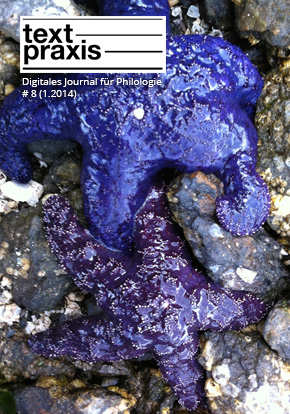Digital Journal for Philology

Textpraxis # 8 (1.2014)
In the current issue, Kai Werbeck addresses the ’68 movement, Hans-Joachim Jakob argues for the use of narratological toos in ›Human-Animal Studies‹ and Johanne Mohs looks at literary writing processes. The response article of Jeewon Kim takes up the debate on system-theoretical literary studies.
Deeply dissatisfied with the student revolution and its ability to challenge Germany’s status quo, the avant-garde poet Rolf Dieter Brinkmann parted ways with the movement after a brief period of mutual sympathy and support. Leaving the political sphere of mass protest behind, he turned his sole attention to the aesthetic realm and sought to ›revive‹ literature after its proclaimed death. This article offers an in-depth re-reading of the titular poems of Brinkmann’s lyrical magnum opus, Westwärts 1 & 2. The article argues that the author rethought the streets as a place where interventions into mediated life could be waged during a post-revolutionary period characterized by political standstill. Reading Westwärts and Westwärts 2 reveals that Brinkmann’s texts vehemently warn against the incorporation of art into the spectacle of mass media and at the same time comment on the ›failure‹ of ’68.
The enormous prosperity of ›Human-Animal Studies‹ in the last decade often led to a frustrated complaint about the unmanageability of a research area that involves many different branches of science. This paper draws on the long tradition of literary and cultural studies in the research of animal images in texts and visual media and advocates to use narratological tools for future investigations. The dog-narrative serves as an example for this argumentation and exemplary texts by Theodor Fontane, Thomas Mann, Franz Kafka and Robert Walser are explored.
This article follows a production-aesthetical approach and analyses difficulties at the beginning of literary writing processes and their resolution using spatial techniques and techniques that play with language. The poetics of OuLiPo (»Ouvroir de littérature potential«) serve as an example and in particular (the genesis of) Georges Perec's novel »La vie mode d'emploi«. It is shown how Perec inserts a blocked elevator ride as a metaphorical reference to his initial writer's block in the novel and how this reference can be understood as a comment to narrate complex space-time fabric in the social novel of the 20th century, in particular to Marcel Proust's »Search« can be understood.
